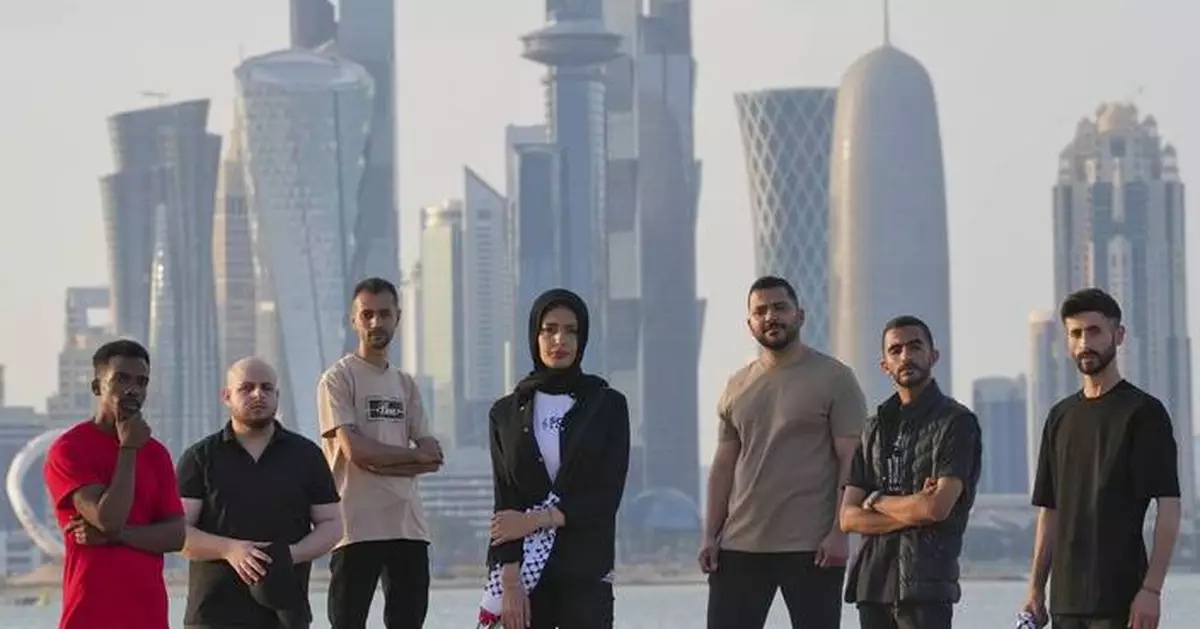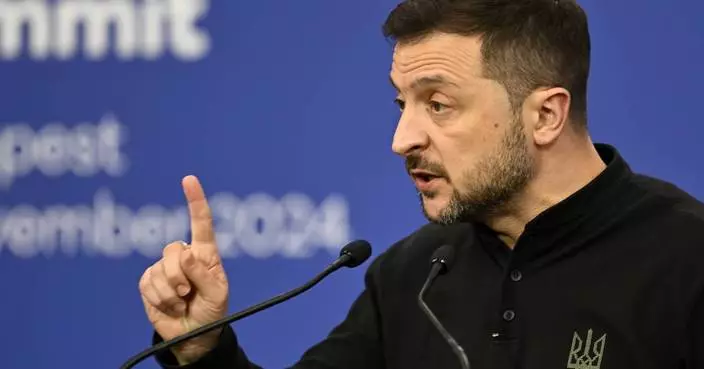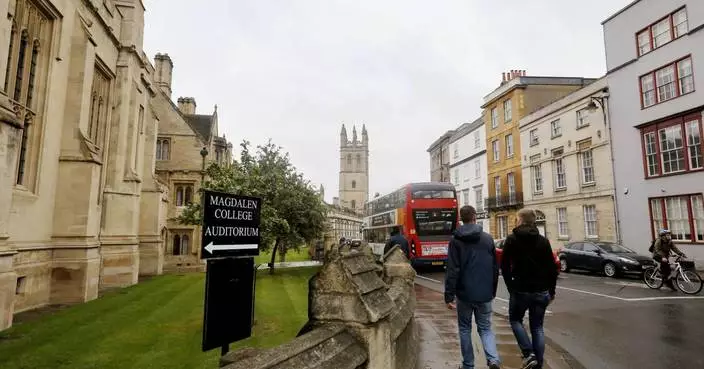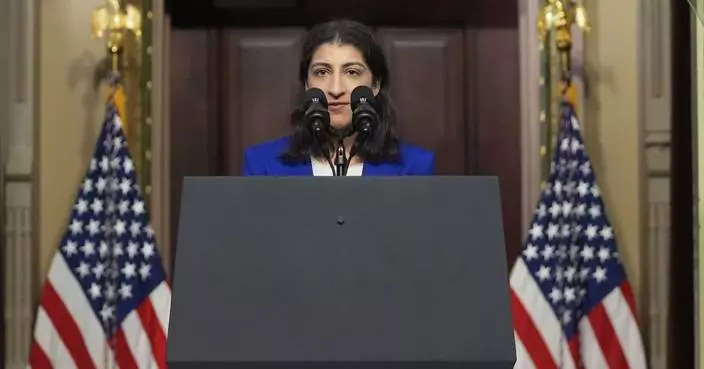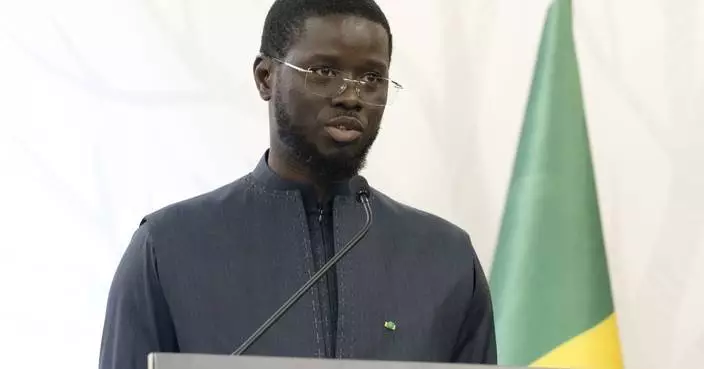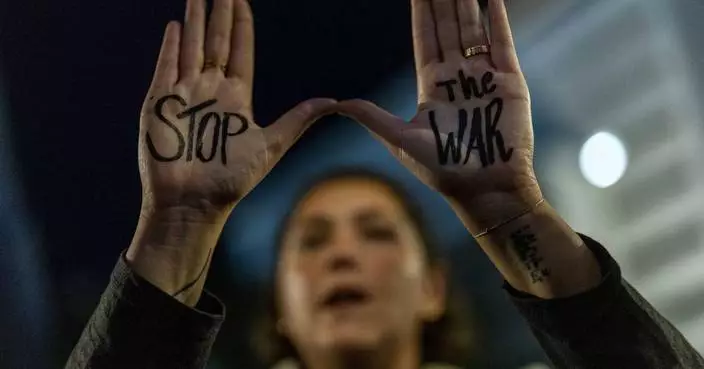DOHA, Qatar (AP) — They stroll Doha's waterfront promenade and sing softly about children who are now “birds in heaven,” flying free of the pain of the war in Gaza.
For the Palestinian group Sol Band, it seems surreal that weeks ago they were hiding from Israeli shelling.
“I just want the war to end,” said Rahaf Shamaly, the band’s main vocalist and only woman. “I want to return to Gaza, walk and clean up its streets, hug my family, and sing with the band in the place where we started from.”
Five of the band's seven musicians returned to Gaza in August to work on their next album.
“We had a lot of music and performances planned,” said Fares Anbar, the band’s percussionist.
But on Oct. 7, Hamas, along with other militants, attacked southern Israel, killing 1,200 people and taking 250 others hostage. Israel retaliated with a military campaign that has so far killed more than 35,000 people and leveled large swaths of Gaza.
In April, the five bandmates were able to leave Gaza via Egypt to Qatar.
The band — which formed in 2012 and plays both traditional Arabic songs and their own modern pop songs — has long served as a refuge for its members who grew up in Gaza amid grinding poverty and other hardships. Their home, a 360-square-kilometer (140-square-mile) enclave, has been blockaded for years by Egypt and Israel. Its population of 2.3 million Palestinians has suffered through previous rounds of war between Israel and Hamas, which has ruled the strip since 2007.
“Living under a siege, an occupation, and living through very difficult circumstances … music was my only escape since I was a child,” the band’s founder and percussionist, Said Fadel, said.
Music shaped Fadel's life. His grandfather was one of the first percussionists in the area and his grandmother played the oud, a lute-like stringed musical instrument common in the Middle East and Africa.
Of Sol Band's songs, “Raweq Wa Haddy," or “Chill Down,” is their most famous. The lyrics that promise “great days coming back,” now seem a lifetime away for people who are moving from place to place, hiding from airstrikes.
After returning to Gaza in August to record, the five members of the band filmed themselves surviving the attacks and shared the videos online whenever an internet connection allowed. Music remained their lifeline and their main hope; they created songs, often amid the rubble, with sounds of explosions in the background. They filmed music videos from where they sheltered, urging people not to lose hope and remain resilient in the face of adversity.
Some songs touched on those killed by Israeli airstrikes, particularly children.
“My children are birds in heaven, lucky is heaven to have them,” one song goes. “All my life I hoped to raise them and see them grow up before my eyes.”
In shelters and camps across Gaza, Sol Band's five members held activities for displaced children to keep their minds off what was happening. Anbar, the band's percussionist, even taught some how to keep a beat as a drummer.
They posted videos of themselves in tents, playing the guitar and drums, with smiling children who sang along.
“The children’s interaction with the music, and how they forgot everything that is happening around them … it proved to me the importance of music in our lives and the effect it has in the Gaza Strip,” he said.
The five band members who left Gaza via Egypt to Qatar had been scheduled to perform on the first stop of their tour “The Journey Begins” at a Palestinian culture festival in Doha. Though the band has achieved fame internationally, like other Palestinians they hold travel documents that often involve complicated requirements, and at times they face outright visa rejections.
“Our passports are Palestinian, (and our) birthplace Gaza,” Anbar said. “This made it very difficult for us to get visas.”
With pending shows in Belgium and Tunisia, there is little guarantee that they will make it there. And if their visa situation is not sorted out in Qatar, the five will eventually have to return to Gaza — and an uncertain future.
“Would the plans we had before the war still happen?” asked Hamada Nasrallah, a vocalist. “We have no clear answers.”

From left, Fares Anbar, Abood Qassim, Rahaf Shamaly, Hamada Nasrallah, Ahmed Haddad and Said Fadel of the Gaza Strip-based Sol Band prepare for a practice session in Doha, Qatar, Friday, May, 3, 2024. (AP Photo/Lujain Jo)

From left, Said Fadel, Samir al Borno, Abood Qassim, Rahaf Shamaly, Ahmed Haddad, Fares Anbar and Hamada Nasrallah of the Gaza Strip-based Sol Band pose for a photograph in Doha, Qatar, Thursday, May 2, 2024. (AP Photo/Lujain Jo)
ROME (AP) — Pope Francis has called for an investigation to determine if Israel’s attacks in Gaza constitute genocide, according to excerpts released Sunday from an upcoming new book ahead of the pontiff's jubilee year.
It's the first time that Francis has openly urged for an investigation of genocide allegations over Israel's actions in the Gaza Strip. In September, he said Israel's attacks in Gaza and Lebanon have been “immoral” and disproportionate, and that its military has gone beyond the rules of war.
The book, by Hernán Reyes Alcaide and based on interviews with the Pope, is entitled “Hope never disappoints. Pilgrims towards a better world." It will be released on Tuesday ahead of the pope's 2025 jubilee. Francis’ yearlong jubilee is expected to bring more than 30 million pilgrims to Rome to celebrate the Holy Year.
“According to some experts, what is happening in Gaza has the characteristics of a genocide,” the pope said in excerpts published Sunday by the Italian daily La Stampa.
“We should investigate carefully to determine whether it fits into the technical definition formulated by jurists and international bodies,” he added.
Last year, Francis met separately with relatives of Israeli hostages in Gaza and Palestinians living through the war and set off a firestorm by using words that Vatican diplomats usually avoid: “terrorism” and, according to the Palestinians, “genocide.”
Francis spoke at the time about the suffering of both Israelis and Palestinians after his meetings, which were arranged before the Israeli-Hamas hostage deal and a temporary halt in fighting was announced.
The pontiff, who last week also met with a delegation of Israeli hostages who were released and their families pressing the campaign to bring the remaining captives home had editorial control over the upcoming book.
The war started when the militant Hamas group attacked Israel on Oct. 7, 2023, killing 1,200 people and abducting 250 as hostages and taking them back to Gaza, where dozens still remain.
Israel’s subsequent yearlong military campaign has killed more than 43,000 people, according to Gaza health officials, whose count doesn’t distinguish between civilians and fighters, though they say more than half of the dead are women and children.
The Israel-Hamas conflict in Gaza has triggered several legal cases at international courts in The Hague involving requests for arrest warrants as well as accusations and denials of war crimes, crimes against humanity and genocide.
In the new book, Francis also speaks about migration and the problem of integrating migrants in their host countries.
“Faced with this challenge, no country can be left alone and no one can think of addressing the issue in isolation through more restrictive and repressive laws, sometimes approved under the pressure of fear or in search of electoral advantages,” Francis said.
“On the contrary, just as we see that there is a globalization of indifference, we must respond with the globalization of charity and cooperation,” he added. Francis also mentioned the “still open wound of the war in Ukraine has led thousands of people to abandon their homes, especially during the first months of the conflict.”
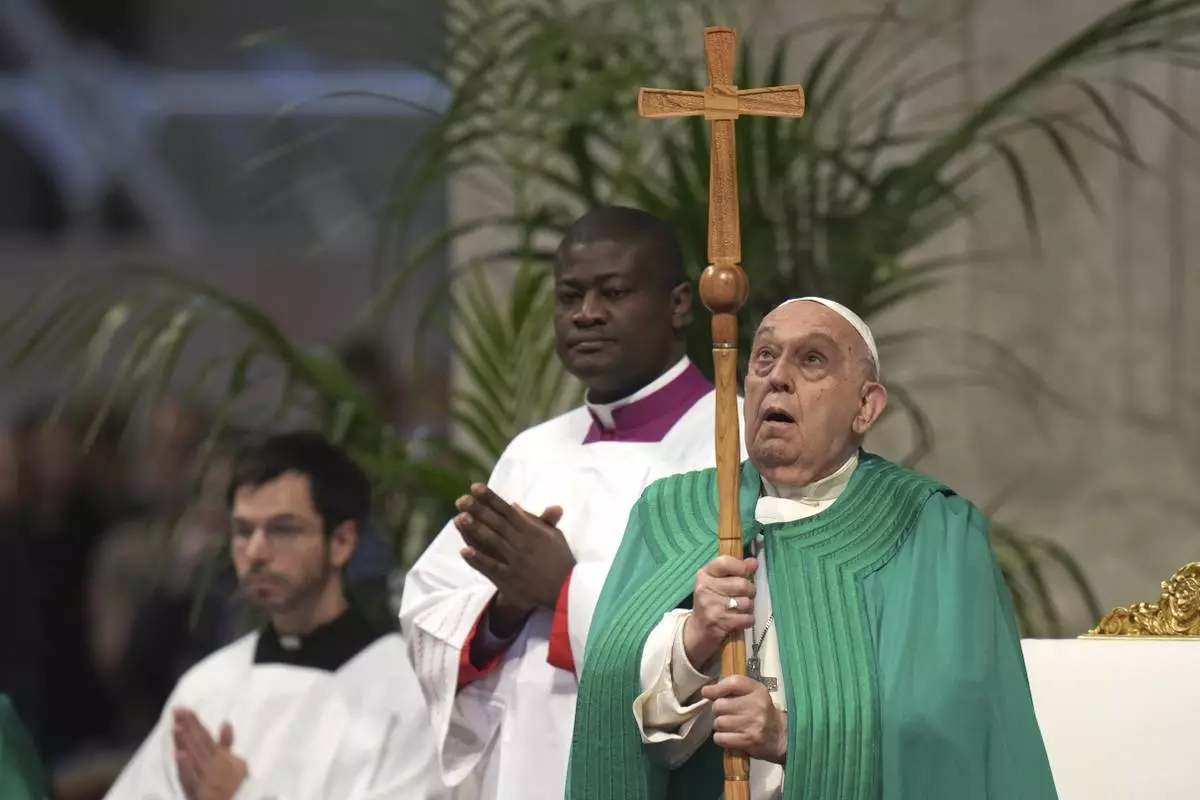
Pope Francis looks at the cross as he presides over a mass on the occasion of the World Day of the Poor in St. Peter's Basilica, at the Vatican, Sunday, Nov. 17, 2024. (AP Photo/Alessandra Tarantino)
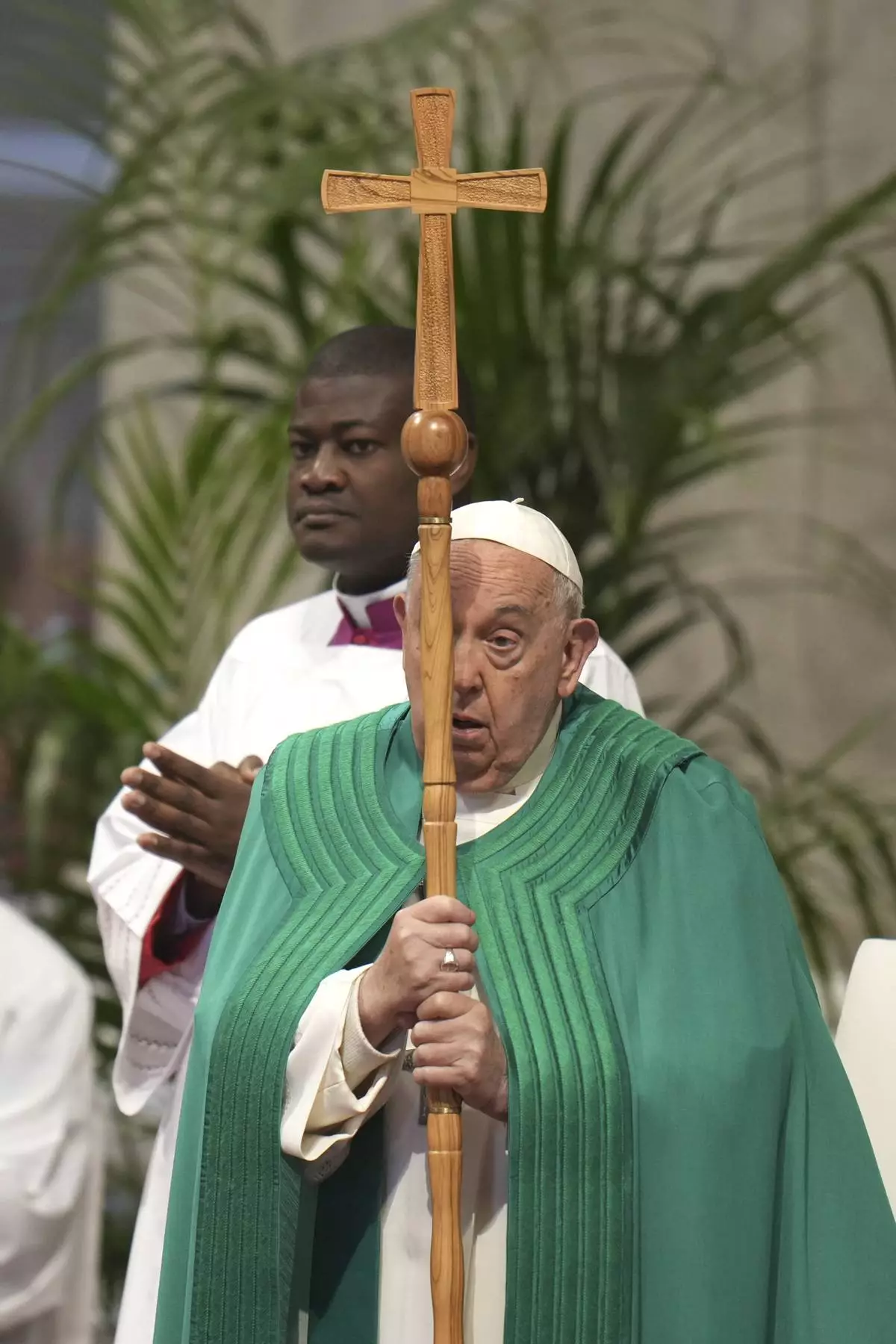
Pope Francis holds the cross as he presides over a mass on the occasion of the World Day of the Poor in St. Peter's Basilica, at the Vatican, Sunday, Nov. 17, 2024. (AP Photo/Alessandra Tarantino)
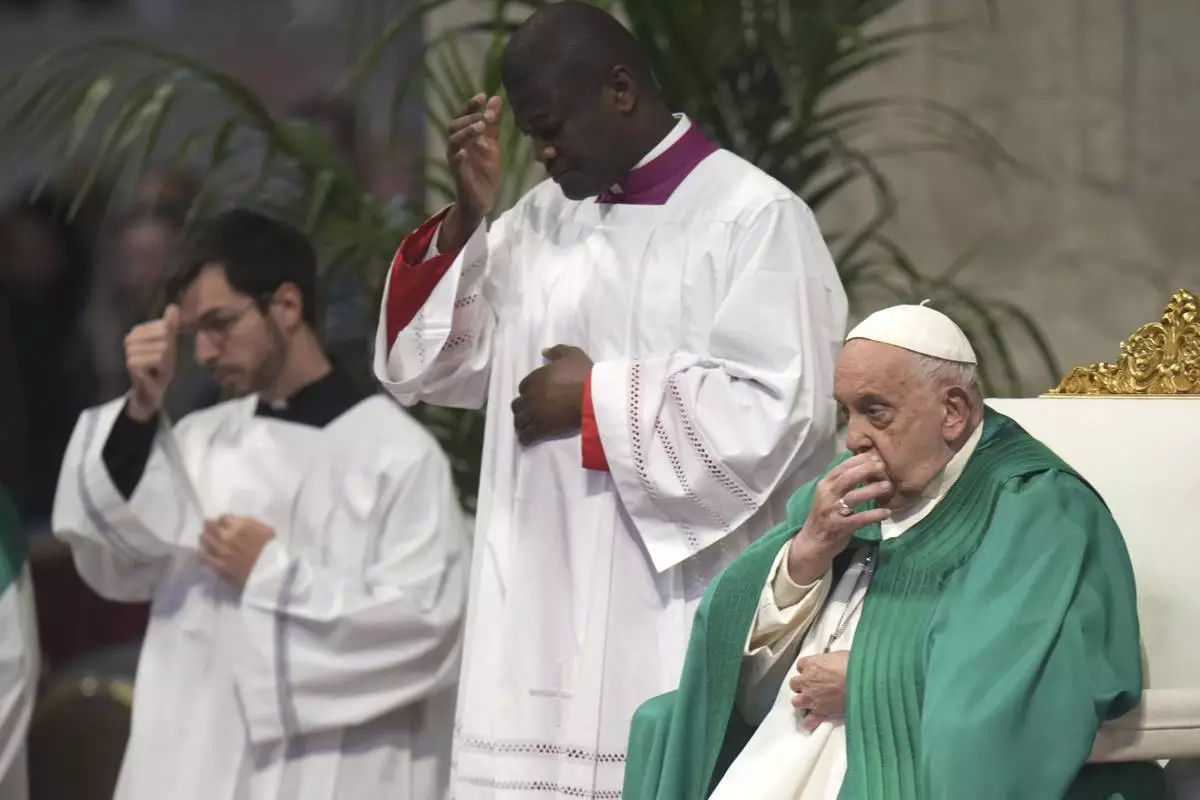
Pope Francis presides over a mass on the occasion of the World Day of the Poor in St. Peter's Basilica, at the Vatican, Sunday, Nov. 17, 2024. (AP Photo/Alessandra Tarantino)
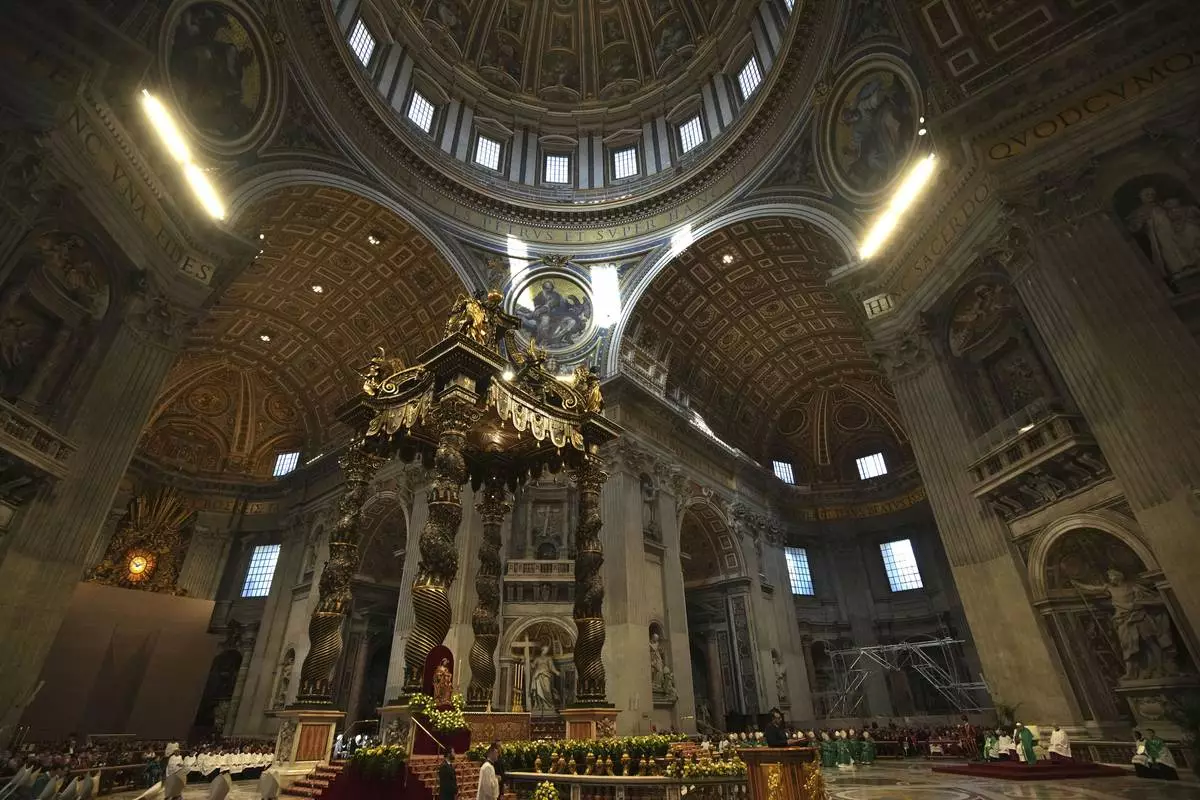
A view of St. Peter's Basilica as Pope Francis presides over a mass on the occasion of the World Day of the Poor, at the Vatican, Sunday, Nov. 17, 2024. (AP Photo/Alessandra Tarantino)
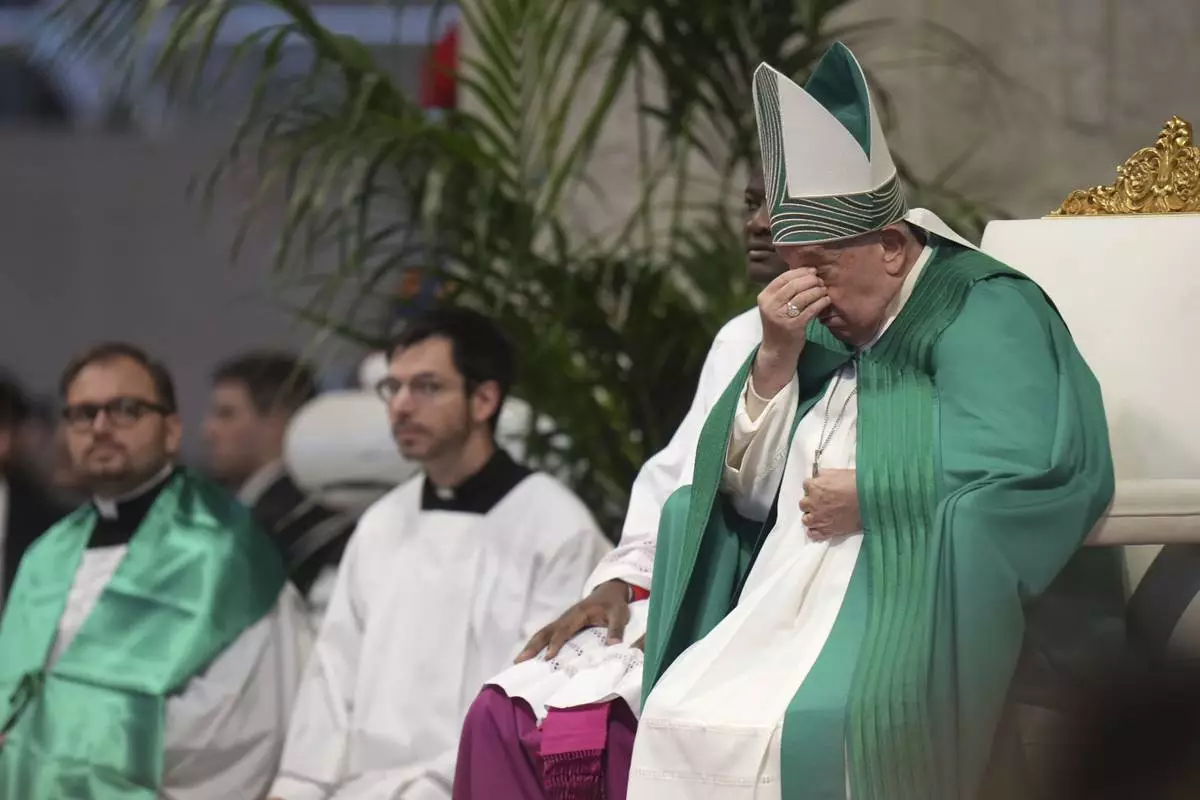
Pope Francis presides over a mass on the occasion of the World Day of the Poor in St. Peter's Basilica, at the Vatican, Sunday, Nov. 17, 2024. (AP Photo/Alessandra Tarantino)
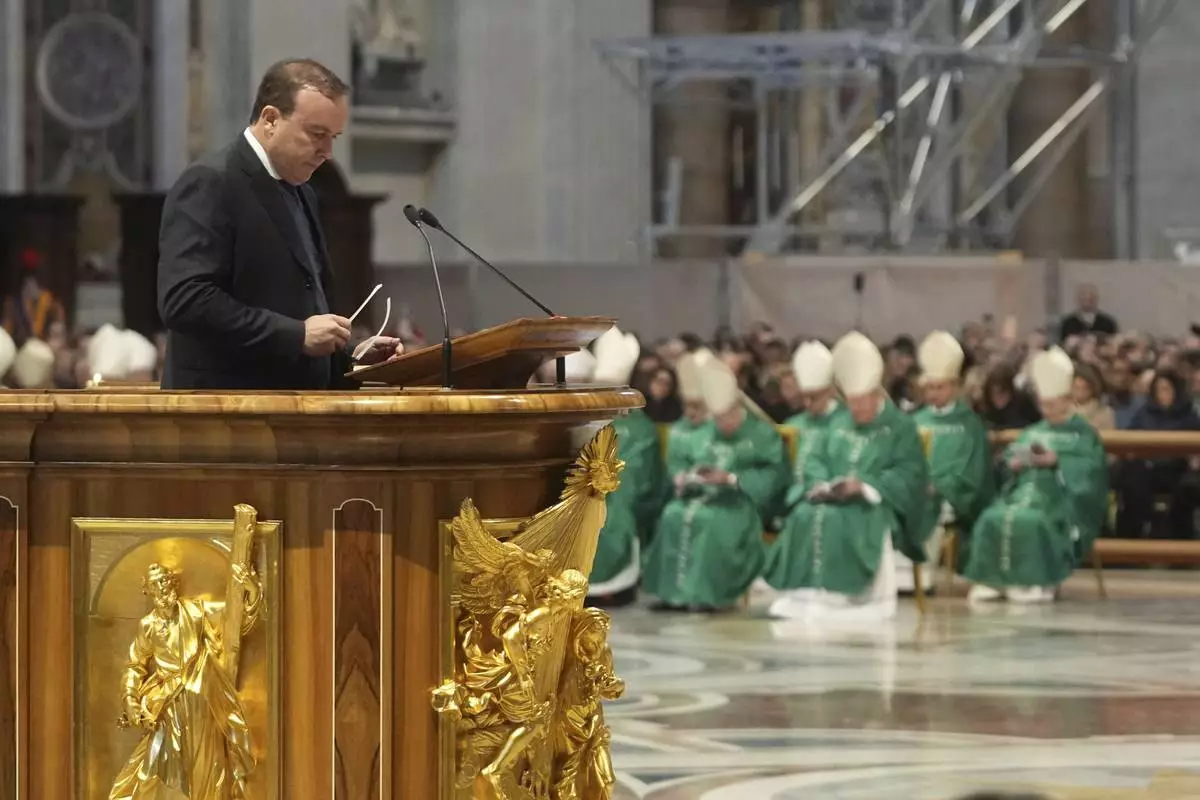
Abel Eduardo Balbo, former soccer player from Argentina, reads during a mass presided by Pope Francis on the occasion of the World Day of the Poor in St. Peter's Basilica, at the Vatican, Sunday, Nov. 17, 2024. (AP Photo/Alessandra Tarantino)
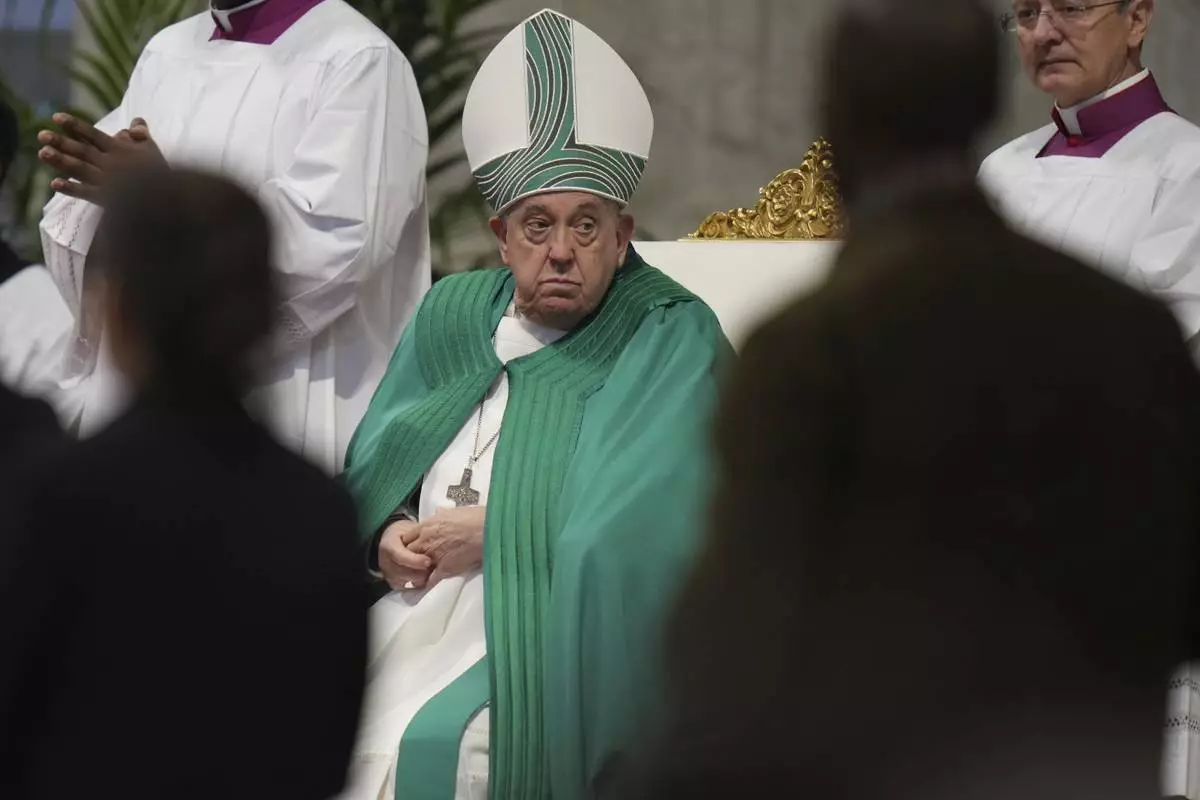
Pope Francis presides over a mass on the occasion of the World Day of the Poor in St. Peter's Basilica, at the Vatican, Sunday, Nov. 17, 2024. (AP Photo/Alessandra Tarantino)
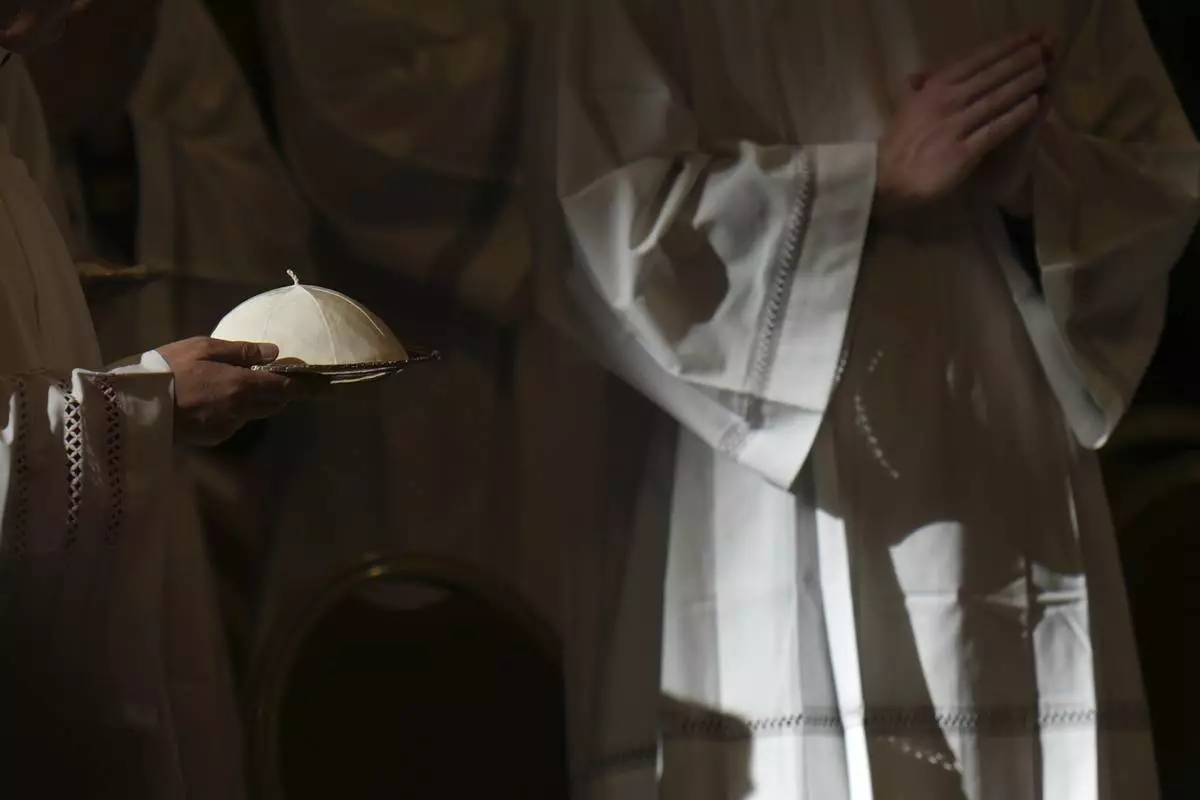
A priest carries Pope Francis skull-cap as he presides over a mass on the occasion of the World Day of the Poor in St. Peter's Basilica, at the Vatican, Sunday, Nov. 17, 2024. (AP Photo/Alessandra Tarantino)
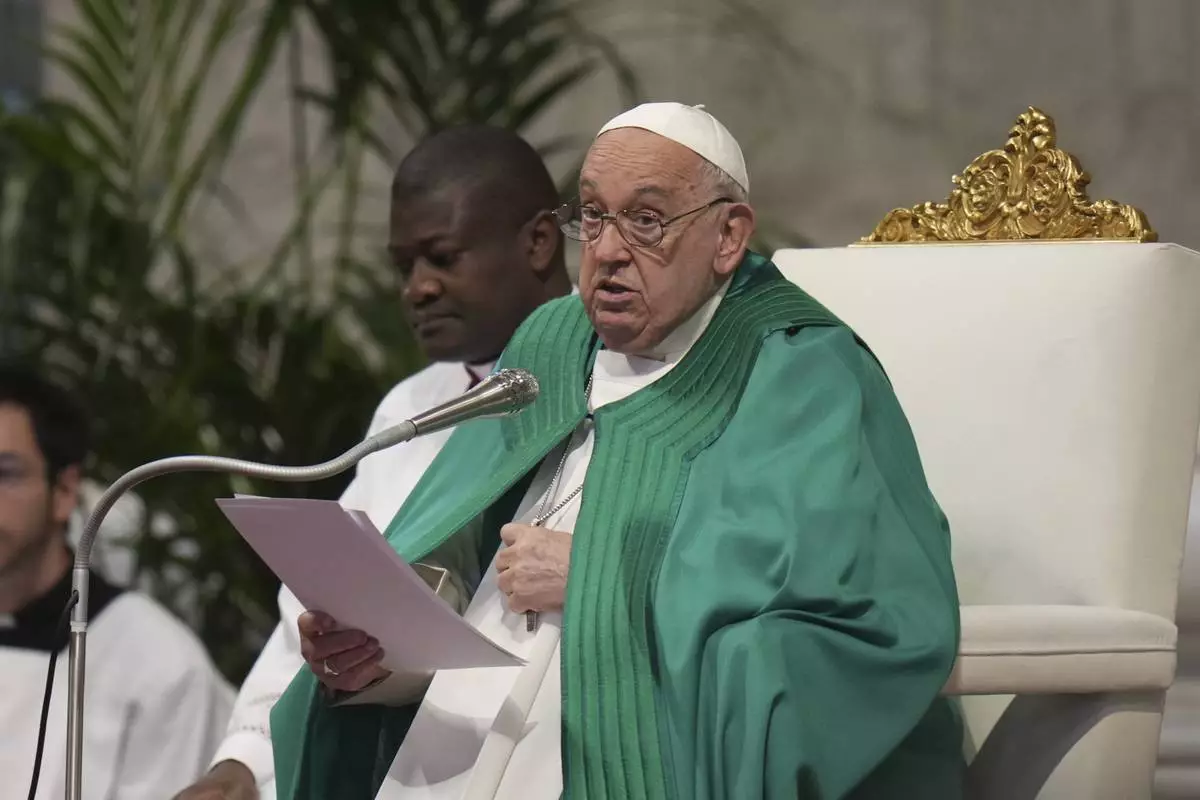
Pope Francis delivers his speech during a mass on the occasion of the World Day of the Poor in St. Peter's Basilica, at the Vatican, Sunday, Nov. 17, 2024. (AP Photo/Alessandra Tarantino)




